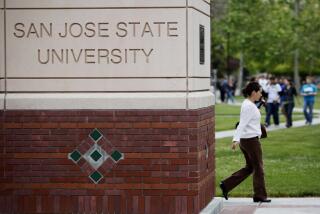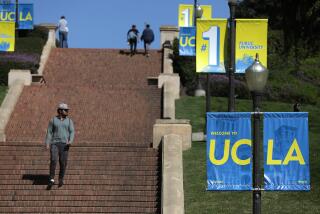PERSPECTIVE ON JAPAN : Reciprocity Is Needed in Academia : Barriers against foreign scholars rob their students of outside perspectives in a lock-step system.
- Share via
Not long ago, Japanese business organizations announced that they planned to establish a 30-billion yen scholarship fund ($271 million at the current rate of exchange) at Harvard University to commemorate the marriage of Harvard graduate Masako Owada and Crown Prince Naruhito. The money would be used, spokesmen said, to promote studies to help bridge social and cultural gaps between Japan and the United States.
Harvard itself may be one such bridge between the two countries. Japan has long been sending some of its best students and bureaucrats there for undergraduate and graduate studies. Edwin O. Reischauer, ambassador to Japan in the Kennedy and Johnson Administrations, started and finished his teaching career at Harvard. And the current director of the Edwin O. Reischauer Institute of Japanese Studies at Harvard, and holder of an endowed chair in American history, is the prominent Japanese-born scholar Akira Iriye.
But there are many other American universities where Japanese-born professors hold important, tenured positions. In the Japan Foundation’s directory of Japan specialists in the United States and Canada, fully 17% of the 1,420 individuals listed are Japanese men and women born in Japan, and many of these individuals--while permanent residents of the United States or Canada--retain their Japanese citizenship. Why is it, then, that there are almost no foreign tenured professors in Japan--not even ones who might be assumed to have a clear advantage over Japanese candidates: for example, Americans teaching American literature, Germans teaching German, Italians teaching Italian, and so on?
Japanese with whom one raises this question will tell you that the Mombusho--the Ministry of Education--until recently forbade hiring foreigners in “national” universities such as Todai (Tokyo University). But there are many prestigious private universities in Japan--Keio and Waseda to name only two--and they practice the same discrimination.
“Foreigners do not know Japanese well enough to teach in Japanese universities on regular appointments and engage in the full range of committee work that would be required of them,” is another excuse. But now we have the interesting case of Dr. Ivan Hall, which puts the lie to this argument.
Hall, a Harvard Ph.D. in history, whose thesis supervisor was Edwin Reischauer, is fluent in Japanese. He has lived in Japan for 20 years and taught for nine as a visiting professor at Japanese universities. Three years ago, he landed a job at Gakushuin, a private university, once known as the “Peers’ School,” and the alma mater of Emperor Akihito and the Crown Prince. Hall’s lectureship, this time, was a sennin-- what we would call a tenure-track--appointment that also entailed various committee duties. He met all his university obligations, was popular with students (to whom he lectured in Japanese) and had no reason to suppose that his job was at risk.
Nonetheless, this past spring, with almost no notice, he was dismissed from his position with no adequate reasons given. Some of his friends suspect that a recent article he published in the National Interest, titled “Samurai Legacies, American Illusions,” may have angered some conservative Gakushuin professors and led to his ouster. In his article, Hall observed that “Foreign lawyers, journalists, and academics still run up against professional barriers that are not encountered by their Japanese counterparts working in the West . . . What makes Japan fundamentally different is that its racially based national consciousness and exclusivity, far from being the objects of attack, disdain, and efforts at amelioration, are openly sanctioned by the intellectual Establishment, public consensus, and government policy.”
Although he would be the last person to decry Japan’s generous grant to his alma mater, Hall also warns in his article that such generosity requires a watchful eye on our part. Scholars who accept Japanese money to do their research may be tempted to choose inoffensive “safe subjects.” Worse, they may skew their results to please their patrons. In academia, as elsewhere, he who pays the piper often does call the tune. Hall’s dismissal from Gakushuin may be a subtle message to others about this fact of life.
But if Hall’s removal is not a punishment for his views, the implication is even more serious. For then it is simply a case of the Japanese academic Establishment ridding itself of an outsider: saying, in effect, we don’t want a foreign scholar in our midst, no matter how smart, how competent or how fluent in Japanese.
No American academic is going to call for the wholesale ouster of Japanese-born scholars from our universities in retaliation for the closed nature of Japanese universities. But reciprocity--that much-invoked word in trade negotiations--would be very welcome in Japan’s academia. It would also supply Japanese students with some much-needed fresh air in their otherwise highly regimented, lock-step educational system.
More to Read
Sign up for Essential California
The most important California stories and recommendations in your inbox every morning.
You may occasionally receive promotional content from the Los Angeles Times.










